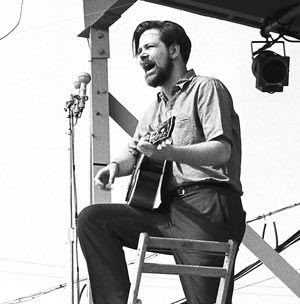I began listening to Dave Van Ronk in November 2023. I often referenced a listener's guide to Van Ronk's discography written by Elijah Wald, a music journalist who has written extensively on the subject. I quit his discography after being disappointed with Just Dave.
Sings Ballads, Blues, and a Spiritual (1959): B
Van Ronk Sings (1961): B+
Dave Van Ronk, Folksinger (1962): A
In the Tradition (1963): C+
Dave Van Ronk and the Ragtime Jug Stompers (1964): C+
Inside Dave Van Ronk (1964): B
Just Dave Van Ronk (1964): C+
Sings Ballads, Blues, and a Spiritual (1959):
Longtime resident of New York City, Van Ronk was an early figure of the folk scene in Greenwich Village. Influenced by the blues and folk music, he sang with the stylings of African American blues singers while also recording from the folk canon established by Pete Seeger. Although his vocal imitation of African Americans was controversial enough for Van Ronk to address and defend it in his debut's liner notes, his vocal delivery is emotional, intimate, and authentic and his willingness to cover the blues was an important step in bringing an authentic version of the genre to a wider audience. Though not everything on his debut is a winner, the weakest cuts are contemplative enough to be moving and his dedication to the craft never falters. B
Van Ronk Sings (1961):
Although his first album showed his broad influences, this one more tightly focuses on the blues. Because his gruff vocal and general approach always nicely aligned with the blues, his second album sees the artist strengthening his grip of recording and emotional persuasion. His sophomore LP is, however, a little one-note, which hurts its playability. B+
Dave Van Ronk, Folksinger (1962):
Ronk's deeply personal style of covering folk songs almost certainly reaches its peak. His intricate guitar picking and vocals are delivered with such powerful intensity and simple causality that's hard to believe he was less than thirty years old when recording this album. Not only do these tightened skills help him pull off somber blues ("Motherless Blues" and "Cocaine Blues"), emotional turmoil ("Poor Lazarus" and "He Was a Friend of Mine"), and utter bleakness ("Hang Me, Oh Hang Me") like never before, but he sweetens his touch to great effect on the biblical children's song "Mr. Noah," the African folk song "Chicken Is Nice," and "You've Been a Good Old Wagon." On most albums, these would be throwaways, but Ronk drops his head, closes his eyes, and inhibits them just like the others, delivering them to perfection. In the end, they're more than just charming changes of pace. A
In the Tradition (1963):
Although Ronk was a folk singer, he also had a healthy background in jazz. Thus, for his fourth album, he records half of the songs with a traditional jazz band while the other half is the solo acoustic folk music he's done before. The traditional jazz band is pleasantly done but it teeters upon abrasive as the album switches between the two widely different styles. If they were separated to their own sides, maybe it would be a different story. As it is, however, it's better to skip the jazz songs, which probably wouldn't have gotten many replays from this critic anyway. Although the solo cuts don't quite have the staying power of his last album, In the Tradition does introduce a few nice tunes and one of his most famous cuts "Green Rocky Road." C+
Dave Van Ronk and the Ragtime Jug Stompers (1964):
This offers some pretty enjoyable instrumental rags ("Saint Louis Tickle," "Temptation Rag," and "Georgia Camp Meeting") and even one good vocal: Dave's version of "Mack the Knife." For anything further, you came to the wrong place. C+
Inside Dave Van Ronk (1964):
Although outtakes from undoubtedly his best album, these tracks are much less polished and certainly more second-rate, both in terms of emotional pull and memorable melodies. Next to a few Ronk classics, perhaps some of these songs would prove to be worthwhile company. With the company they do have, they helplessly fade into the background during casual listening. B
Just Dave Van Ronk (1964):
Because Inside Dave came from outtakes from Folksinger, Just Dave was an important title, his first solo folk album since 1962. For fans, that automatically makes it a significant release and even a classic in his discography. However, many of the quiet four minute songs drag on, especially "Frankie's Blues," which nearly sounds like its predecessor "Candy Man." "The House of the Rising Sun" bores too: while Dylan utilized Van Ronk's arrangement of the song to great effect on his debut, Van Ronk doesn't bring any magic at all to his studio cut. Interestingly, the album never suffers from a lack of emotional commitment; in fact, it's quite the opposite. It's dragged down by incessant moaning, cracking vocals, and intense growls while never being balanced out by humorous or light-hearted moments. C+
